最新外研版七下笔记
外研版英语七年级下册知识点(通用8篇)

外研版英语七年级下册知识点(通用8篇)外研版英语七年级下册知识点(1)一、单词辨析wear, in 与putwear 动词,穿着,戴着。
强调穿的状态。
in 介词,后接衣服或颜色的词。
着重衣服的款式或颜色。
put on 动词,穿上,戴上,强调穿的动作,后接衣服,鞋帽。
spend 花费,度过①+ spend +时间/金钱+ on 人在上花费时间/金钱eg:I spend much time on②+ spend +时间/金钱+ ( in) doing 花费时间金钱做某事eg: I spend much time watching③+spend +时间+ with + 和某人一起度过。
eg: I spend my weekend with my二、短语forward to + / 期待某事/期待做某事eg:We are looking forward to visiting Hong 我们都很期待去香港玩。
I am looking forward to your 我很期待你的到来。
go sightseeing = do some sightseeing观光游览类似结构:go shopping 购物 go cooking 做饭go washing 洗衣服 go cleaning 打扫卫生a picnic 去野餐英语中经常用have或take, make等动词+ 组成词组。
eg:have a good time 玩得高兴 have a rest 休息一会take a walk 散步 make a presentation 做一个介绍oneself 过的愉快相当于have a good time, 在口语中,用作祈使句。
eg:I’m going to enjoy myself during the May Day 我打算在五一假期好好玩一玩。
I hope you enjoy yourself this 我希望你今晚过的愉快。
七下英语外研版知识笔记第二单元

七下英语外研版知识笔记第二单元The second unit of the seventh-grade English textbook "New Standard English" focuses on the topic of "My School Life." In this unit, students will learn vocabulary related to school subjects, daily routines, and personal pronouns. They will also practice using the present simple tense to talk about their daily activities and routines.七年级英语教材《新标准英语》第二单元的主题是“我的学校生活”。
在本单元中,学生将学习与学校科目、日常生活和人称代词相关的词汇。
他们还将练习使用现在简单时谈论他们的日常活动和生活习惯。
The vocabulary introduced in this unit includes subjects such as mathematics, science, English, and geography. Students will also learn how to use phrases to talk about their daily routines, such as "I have breakfast at 7 o'clock" or "I do my homework in the evening." This vocabulary will enable students to describe their school schedule and daily activities in English.本单元介绍的词汇包括数学、科学、英语和地理等科目。
外研版英语七年级下册知识点总结

最新外研版英语七年级下册知识点总结-CAL-FENGHAI.-(YICAI)-Company One1最新外研版英语七年级下册知识点总结Module 1 Lost and found1、lost and found 失物招领 the lost and found box 失物招领箱2、(1) welcome back to 欢迎回到某地... Welcome back to school.(2) welcome to +地点的名词欢迎来某地 Welcome to China.(3) Welcome 跟地点副词时不带to welcome home 欢迎回家 Welcome here .(4) You are welcome. 不用谢。
(5) give sb. a warm welcome 热烈欢迎某人 They gave a warm welcome to us. 3、first of all 首先 = at first / firstly (常位于句首作状语,强调首要的事情或动作)First of all, you should finish your homework.4、there be 句型中谓语动词采用就近原则 There is some food in the fridge.5、a lot of =lots of 许多既可以修饰可数名词复数,也可以修饰不可数名词。
There is a lot of water in the glass. I have lots of books in my room.6、(1) look at 看(强调“看”的动作) Come and look at my new coat.(2) look (不及物动词,单独使用,用以引起对方的注意) Look! That’s anEnglish car.(3) see 看见 (及物动词,强调“看”的结果) Can you see the bird in the tree?(4) watch 观看,仔细地看(比赛、电视、戏等) They are watching TV now.(5) read 看(书、报纸、杂志等) My mother is reading a book /a magazine /a newspaper.7、everyone/everybody 做主语,谓语动词用单数形式。
最新外研版七年级英语下册知识点整理(最新整理)

外研版七年级下册知识点整理MODULE 1 Lost and Found重点短语1. lost and found box 失物招领箱2. welcome back 欢迎回来3.first of all 首先4. here is/are... 这有...5. from now on 从现在开始6. be careful with 小心保管7. whose bag 谁的包8. talk to sb. 与某人交谈9. mobile phone 移动电话,手机10. get on 上车( get off 下车)11. two thousand 两千(thousands of 数以千计的...)12. look for 寻找13. at the moment 现在14. in a hurry 匆忙地15. A lot of 许多,大量16. hundreds of 数以百计的17. on the train 在火车上18. every day 每天19. such as 例如20. make a list of 列一张...的清单21. ask/answer questions 问/回答问题重点句子:1.Welcome back to school! 欢迎回到学校。
2.Whose bag is this? 这是谁的书包?3.It’s mine. 它是我的。
4.Are these crayons yours? 这些是你的蜡笔吗?5. Whose tapes are these? 这些是谁的磁带?6. Here’s a purple wallet! 这儿有个紫色钱包。
7. I think it’s Betty’s. Lingling. 我认为它是玲玲的。
8. Everyone, please be careful with your things from now on. 请大家从今以后仔细对待你们的东西。
新外研版七年级下册知识点整理M9-M12
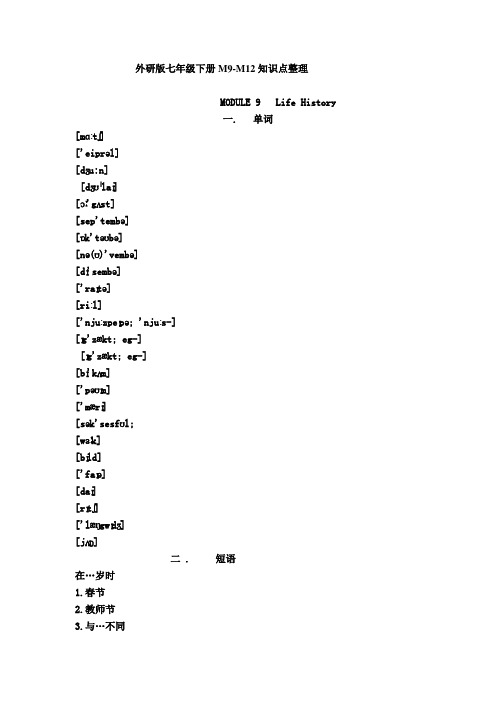
外研版七年级下册M9-M12知识点整理MODULE 9 Life History一. 单词[mɑːtʃ]['eiprəl][dʒu:n][dʒʊˈlaɪ][ɔː'gʌst][sep'tembə][ɒk'təʊbə][nə(ʊ)'vembə][dɪ'sembə]['raɪtə][riːl]['njuːzpeɪpə; 'njuːs-][ɪg'zækt; eg-][ɪg'zækt; eg-][bɪ'kʌm]['pəʊɪm]['mærɪ][sək'sesfʊl;[wɜːk][bɪld]['faɪə][daɪ][rɪtʃ]['læŋgwɪdʒ][jʌŋ]二 . 短语在…岁时1.春节2.教师节3.与…不同4. 妇女节5.发现6.国庆节7.在网上8. 儿童节9.也10.新年11.离开学校12.劳动节( )或()13.用许多其他的语言14.半小时15.五点半16.值得做17. 发现,查明,弄清18.世界各地(三种) 1 2 319.值得做某事20.开始做某事21.了解22.向某人学习23.决定做某事24.出生25. 结婚 1[ ];2[ ]三. 重点句子1 我在写为英语课上用关于他的介绍。
2 我们可以在网上找到关于他的资料。
3 他12岁时就离开学校开始了工作了。
4 他做过什么?5 我不知道确切的时间。
6 不过在19世纪60年代,他用了马克·吐温这个名字,并且变得很有名。
7 像四百多年前的许多人一样,莎士比亚的父母不识字。
8 在他14岁毕业的时候,他决定成为一名演员。
9 他成为了一名成功的演员,并开始写剧本。
10 今天你还可以去参观那个剧院,不在已是当年那个建筑了。
11 老剧院发生过火灾12 威廉·莎士比亚52岁去世。
13 你现在依然可以看见他的戏剧以英文和其他许多语言在演出。
(完整)外研社新版七年级下册知识点总结,推荐文档
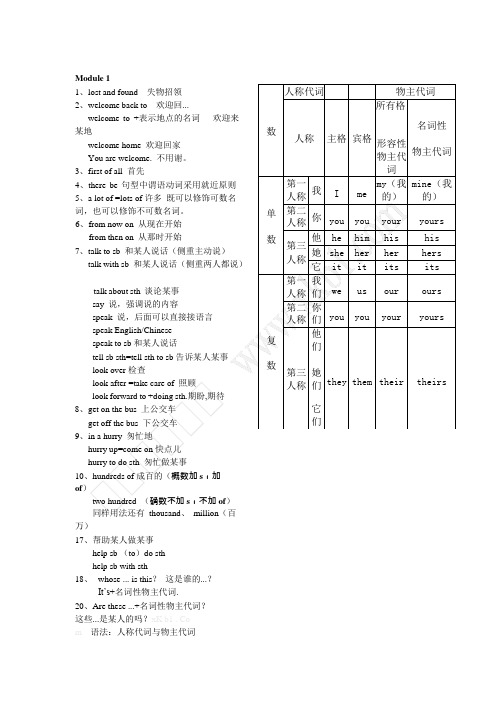
Module 11、lost and found 失物招领2、welcome back to 欢迎回...welcome to +表示地点的名词欢迎来某地welcome home 欢迎回家You are welcome. 不用谢。
3、first of all 首先4、there be 句型中谓语动词采用就近原则5、a lot of =lots of 许多既可以修饰可数名词,也可以修饰不可数名词。
6、from now on 从现在开始from then on 从那时开始7、talk to sb 和某人说话(侧重主动说)talk with sb 和某人说话(侧重两人都说)talk about sth 谈论某事say 说,强调说的内容speak 说,后面可以直接接语言speak English/Chinesespeak to sb 和某人说话tell sb sth=tell sth to sb 告诉某人某事look over 检查look after =take care of 照顾look forward to +doing sth.期盼,期待8、get on the bus 上公交车get off the bus 下公交车9、in a hurry 匆忙地hurry up=come on 快点儿hurry to do sth 匆忙做某事10、hundreds of 成百的(概数加s,加of)two hundred (确数不加s,不加of)同样用法还有thousand、million(百万)17、帮助某人做某事help sb (to)do sthhelp sb with sth18、--whose ... is this?这是谁的...?--It’s+名词性物主代词.20、Are these ...+名词性物主代词?这些...是某人的吗?xK b1 . Com 语法:人称代词与物主代词数人称代词物主代词人称主格宾格所有格形容性物主代词名词性物主代词单数第一人称我I memy(我的)mine(我的)第二人称你you you your yours第三人称他he him his his她she her her hers它it it its its复数第一人称我们we us our ours 第二人称你们you you your yours第三人称他们她们它们they them their theirsModule 21、play 后接乐器时,乐器名词前要加the接球类、棋类名词时,不加the play the piano/the violinplay table tennis/football/basketball2、ride a bike 骑自行车4、would like =wantwould like to do sth=want to do sth想要做某事would like to be=want to be 想要成为...would like sth=want sth 想要某物3、join 加入(团体、组织),并成为其中一员join in 加入活动take part in 参加加入活动(侧重发挥积极作用)4 、what about you?=how about you?你呢?what about doing sth?=how about doing sth?做某事怎么样?5、因为because,所以so 不能同时出现在一个句子中8、teach sb sth 教某人某事6、enjoy 后面接名词或动词ing 形式X|k |Module 31、make plans for 为… 制定计划make a plan2、at the weekend 在周末at+时间点/节假日前on+具体某一天on Saturday morningin+时间段,in the morning/ the afternoon/the evening 泛指一天的上午、下午或晚上3、go over 复习X k B 1 . c o m4、do one’s homework 做作业5、help with sth 帮忙做某事help with the housework6、see a movie 看电影7、who else 还有谁else 其他的what else 还有什么8、have a piano lesson 上钢琴课9、come with sb 和某人一起来have a picnic 去野餐10、--would you like to do...?--Yes,I’d love to./I’d love to,but…11、stay at home 待在家里12、alone =by oneself 单独,独自13、人spend 时间/金钱(in)doing sth./on sth.度过表示地点的介词短语物/事情cost (人)+金钱It take(s)sb. some time to do sth.人pay (金钱)for 物.14、I’m not sure. 不确定.15、look forward to 后接代词、名词或doing16、make friends with sb 和某人交朋友17、wear 穿,(强调穿着,状态)宾语是衣服put on 穿上,(强调动作)宾语是衣服dress 穿衣,(强调动作)宾语是人dress sb./oneself 给某人/自己穿衣打扮18.hope to do sth 希望做某事hope +that 从句希望...注意:有wish sb. to do sth.的用法,hope 没有这种用法!7、between 在两者之间between …and…8、be good at =do well in 擅长语法:can肯定句结构主语+can +动词原形+其他.否定句结构主语+can’t(can not)+动词原形+其他.一般疑问句把can 提前肯定回答Yes,主语+can. 否定回答No,主语+can’t.19. win 后面接比赛、游戏等win the match 赢得比赛20 、enjoy oneself=have a good time =have fun 玩儿得愉快21、get up 起床22、take a walk=go for a walk 去散步26、be different from 与...不同be the same as 与...相同27、summer camp 夏令营28、go sightseeing 去观光go shopping 去购物go boating 去划船goswimming 去游泳29、do some sports 做运动31、It’s time for sth.=It’s time to do sth.该做某事了.语法:一般将来时be going to+动词原形一共四个要素,一个也不能少!肯定句结构:主语+be going to +动词原形+其他.否定句结构:主语+be not going to +动词原形+其他.一般疑问句:be 动词提前1、in the future 在将来in future 从今以后2、chalk、paper 为不可数名词a piece of+chalk/paper3、in +一段时间,句子用将来时对in+一段时间提问,用How soon 4、maybe 可能,也许一般放句首may be 可能放句子中,may 是情态动词,be 是谓语动词,用原形.5、use ... to do sth 用...做某事6、on the Internet 在网上by Internet 通过网络by +交通工具by bus7、be able to=can 后接动词原形注意:can 只有could 和原形两种形式be able to 可以有各种时态8、not ...any more=no...more 不再...need to do sth 需要做某事,need 是实义动词,有形式变化新|课| 标|第|一| 网need 做情态动词用时,后接动词原形,无变形9、job 指具体的工作,为可数名词work 工作,为不可数名词10、come true 实现常与dream、idea 连用11、mean sth 意味着mean doing sth 意味着做某事mean to do sth 打算做某事12、kind 种类a kind of 一种all kinds of 各种各样的kind 友善的,形容词kindly 友善的,副词13、light rain 小雨--(反)heavy rain14、物做主语时,用expensive 或cheap价格(price)做主语时,用high 或Module 4low15、not only... but also...不仅...而且...also 可省略连接两个主语时,谓语动词就近原则16、traffic jam 交通堵塞复数~ jams17、have to 不得不相当于must,用法同情态动词18、carry 拿,带不强调方向bring 带来Be +主语+going to +动词原形+其他?肯定回答:Yes,主语+be.否定回答:No,主语+be not.注意:表示计划到某地去,谓语动词go 与going 重复,一般只说be going to +地点.take 带走19、change 可做名词,也可做动词change A into B 把A 变成B语法:一般将来时will肯定句结构:主语+will +动词原形+其他. 否定句结构:主语+will not +动词原形+其他.一般疑问句:will 提前Will +主语+动词原形+其他?肯定回答:Yes,主语+will.否定回答:No,主语+won’t(will not). 注意:be going to 表示自己打算做某事,计划做某事或有意做某事will 则表示对未来的猜测Module 51、buy sb sth=buy sth for sb 为某人买某物make sb sth=make sth for sb 为某人做某物cook sb sth=cook sth for sb 为某人做...2、On Mother’s Day在母亲节3、购物相关句型What can I do for you?Can I help you?What color does she like?What size does she take?May I try it on?There’s a sale on t oday.How many/much would you like?How much+ be + sth?I’ll take it.I’ve got some food to buy.4、What about...?=How about...? ...怎么样?5、try on 试穿put on 穿上Turn on 打开hold on 等一下(电话用语)=wait a minutecome on 加油6、Certainly=Sure=Of course 当然。
Module12语法和知识点笔记外研版英语七年级下册

M12语法和学问点笔记语法归纳1.感慨句感慨句是用来表示喜怒哀乐等剧烈感情的句子,通常由how或what来引导。
〔1〕what引导的感慨句中心词是名词,结构为:① What + a(n) +形容词+可数名词的单数形式〔+主语+谓语+其他〕!What a beautiful girl (she is)! (她是)多么美丽的一个女孩啊!②What +形容词+可数名词的复数形式〔+主语+谓语+其他〕!What beautiful flowers (they are)! 〔它们是〕多么美丽的花儿啊!③What +形容词+不行数名词〔+主语+谓语+其他〕!What bad weather (it is)! (它是)多么糟糕的天气啊!〔2〕how引导的感慨句中心词是副词或形容词,结构为:①How +形容词或副词〔+主语+谓语〕!How cold (it is today)!(今日)真冷呀!How well she sings! 她唱得多好呀!② How +主语+谓语!How time flies!时间飞逝!选择疑问句是在句子中供应两个或两个以上可能的答案供对方选择的问句。
读法:or前用声调,or后用降调〔1〕选择疑问句结构Would you like coffee or tea?你想喝咖啡还是茶?Which does Mary like, traditional music or pop music?玛丽喜爱哪一种,传统音乐还是流行音乐?►留意:①选择疑问句可以用be动词、助动词或情态动词开头,但答复时不能用yes 或no,应从所给的选项中选择其一。
Are you from China or America? 你来自中国还是?I am from America. 我来自。
②or 所连接的是并列成分,即or 前是名词,or后也必需是名词,不能前面是名词,后面用动词。
【即学即练】一、用what,what a, what an 或how 填空。
(完整word)外研版七下笔记
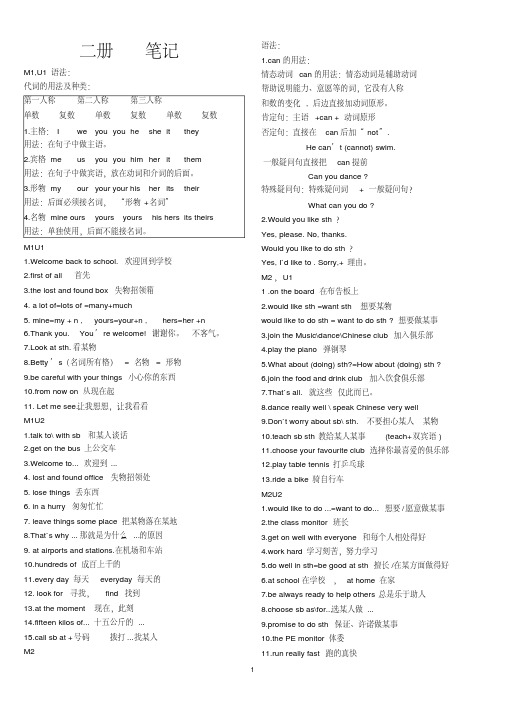
二册笔记M1,U1语法:代词的用法及种类:第一人称第二人称第三人称单数复数单数复数单数复数1.主格:I we you you he she it they用法:在句子中做主语。
2.宾格me us you you him her it them用法:在句子中做宾语,放在动词和介词的后面。
3.形物my our your your his her its their用法:后面必须接名词,“形物+名词”4.名物mine ours yours yours his hers its theirs 用法:单独使用,后面不能接名词。
M1U11.Welcome back to school. 欢迎回到学校2.first of all 首先3.the lost and found box 失物招领箱4. a lot of=lots of =many+much5. mine=my + n , yours=your+n , hers=her +n6.Thank you. You’re welcome! 谢谢你。
不客气。
7.Look at sth.看某物8.Betty’s(名词所有格)= 名物= 形物9.be careful with your things小心你的东西10.from now on从现在起11. Let me see.让我想想,让我看看M1U21.talk to\ with sb 和某人谈话2.get on the bus 上公交车3.Welcome to... 欢迎到...4. lost and found office 失物招领处5. lose things 丢东西6. in a hurry 匆匆忙忙7. leave things some place 把某物落在某地8.That`s why ...那就是为什么...的原因9. at airports and stations.在机场和车站10.hundreds of 成百上千的11.every day 每天everyday 每天的12. look for 寻找,find 找到13.at the moment 现在,此刻14.fifteen kilos of...十五公斤的...15.call sb at +号码拨打...找某人M2 语法:1.can的用法:情态动词can的用法:情态动词是辅助动词帮助说明能力、意愿等的词,它没有人称和数的变化, 后边直接加动词原形。
最新新外研版英语七年级下册m1-12知识点总结
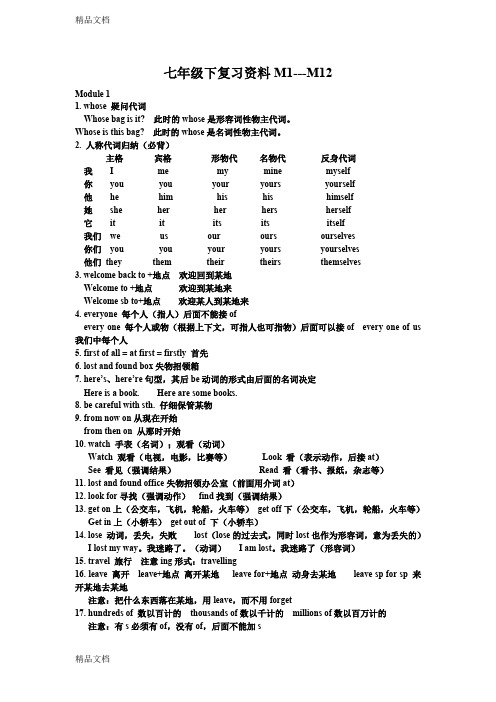
七年级下复习资料M1---M12Module 11. whose 疑问代词Whose bag is it? 此时的whose是形容词性物主代词。
Whose is this bag? 此时的whose是名词性物主代词。
2. 人称代词归纳(必背)主格宾格形物代名物代反身代词我I me my mine myself你you you your yours yourself他he him his his himself她she her her hers herself它it it its its itself我们we us our ours ourselves你们you you your yours yourselves他们they them their theirs themselves3. welcome back to +地点欢迎回到某地Welcome to +地点欢迎到某地来Welcome sb to+地点欢迎某人到某地来4. everyone 每个人(指人)后面不能接ofevery one 每个人或物(根据上下文,可指人也可指物)后面可以接of every one of us 我们中每个人5. first of all = at first = firstly 首先6. lost and found box失物招领箱7. here’s、here’re句型,其后be动词的形式由后面的名词决定Here is a book. Here are some books.8. be careful with sth. 仔细保管某物9. from now on从现在开始from then on 从那时开始10. watch 手表(名词);观看(动词)Watch 观看(电视,电影,比赛等)Look 看(表示动作,后接at)See 看见(强调结果)Read 看(看书、报纸,杂志等)11. lost and found office失物招领办公室(前面用介词at)12. look for寻找(强调动作)find找到(强调结果)13. get on上(公交车,飞机,轮船,火车等)get off下(公交车,飞机,轮船,火车等)Get in上(小轿车)get out of 下(小轿车)14. lose 动词,丢失,失败lost(lose的过去式,同时lost也作为形容词,意为丢失的)I lost my way。
(外研版)初中英语笔记_初一(下)
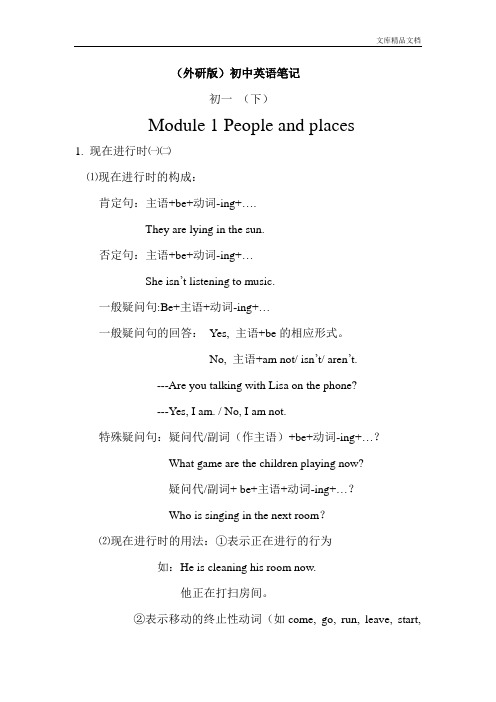
(外研版)初中英语笔记初一(下)Module 1 People and places1. 现在进行时㈠㈡⑴现在进行时的构成:肯定句:主语+be+动词-ing+….They are lying in the sun.否定句:主语+be+动词-ing+…She isn’t listening to music.一般疑问句:Be+主语+动词-ing+…一般疑问句的回答:Yes, 主语+be的相应形式。
No, 主语+am not/ isn’t/ aren’t.---Are you talking with Lisa on the phone?---Yes, I am. / No, I am not.特殊疑问句:疑问代/副词(作主语)+be+动词-ing+…?What game are the children playing now?疑问代/副词+ be+主语+动词-ing+…?Who is singing in the next room?⑵现在进行时的用法:①表示正在进行的行为如:He is cleaning his room now.他正在打扫房间。
②表示移动的终止性动词(如come, go, run, leave, start,begin, arrive, return等),用于进行时表将来。
如:We’re leaving for Hong Kong next week.⑶现在分词(动词-ing)的变化规律:⑷常与现在进行时连用的时间状语:now现在, right now现在,at the moment现在.2. talk to sb.=talk with sb. 同某人谈话。
3. enjoy doing sth. 喜爱做某事。
Eg. She enjoys swimming.enjoy sth. 喜爱某物。
Eg. I enjoy the film very much.4. other “其他的,另外的”例:He has two sons, one is a teacher, the other is a doctor.5. be shopping for “正在购物”例:We’re shopping for new coats all the morning.6. a lot 可以用来修饰动词,表示“很;非常”Her sister looks a lot like her.a lot of/ lots of“大量;许多”,后接可数名词复数或不可数名词均可。
Module10语法和知识点笔记外研版英语七年级下册(1)

M10语法和知识点笔记语法归纳一般过去时的特殊疑问句主语1)疑问词+was+其他?What was wrong with your sister? 你妹妹怎么了?Who was late this morning? 今天早上谁迟到了?2)疑问词+实义动词过去式+其他?Who took my book? 谁拿走了我的书?不作主语1)疑问词+was/were +主语+其他?Where were you yesterday? 昨天你在哪里?特殊疑问句=特殊疑问词+一般疑问句2)疑问词+did +主语+实义动词原形+其他?What did you do yesterday?昨天你做什么了?【即学即练】1.It took her three hours to clean the house.(对划线部分提问)it her to clean the house?2.She was late this morning because her bike was broken.(对划线部分提问)she this morning?3.We went to Beijing by plane. (对划线部分提问)you to Beijing?studied for exams last night.(对划线部分提问)she last night?5.They went to Shanghai last week.(对划线部分提问)they to Shanghai?U11.on holiday:在度假;在休假拓展:go on holiday:去度假My parents are on holiday in Sanya. 我父母在三亚度假。
2.How long did it to take to get there?(教材)到那里花了多长时间?1)how long:多长时间,常用于对“for+一段时间”提问--How long did you live here? --For five years. 你在这儿住多长时间了?--5年。
七年级下册英语知识点笔记外研版

七年级下册英语知识点笔记外研版七年级下册英语知识点笔记——外研版Unit 1 What’s your hobby?1.1 Hobbies• learn some hobby words: playing basketball, playing soccer, playing volleyball, playing tennis, playing ping-pong, playing badminton, playing the piano, playing the guitar, listening to music, dancing, singing, drawing, painting, reading, writing, watching TV, collecting stamps, collecting coins, collecting toy cars, collecting postcards, taking photos, playing computer games, gardening, fishing, hiking, traveling, cooking.•Engage in a conversation and ask “What’s your hobby?” and answer “My hobby is…” (e.g. “My hobby is playing basketball.”)1.2 Simple present• learn how to make positive and negative sentences using the simple present with different subjects (e.g. “I/You/We/They play basketball.” “He/She/It doesn't play basketball.”)• learn how to ask questions in the simple present with “Do” and “Does” (e.g. “Do you play basketball?” “Does he play basketball?”)Unit 2 I’m hungry.2.1 Food and drink• learn some food and drink words: pizza, hamburger, sandwich, hot dog, noodles, dumplings, rice, egg, bacon, fruit juice, milk, coffee, tea • learn how to express likes and dislikes: “I like…” “I don't like…”• Engage in a conversation and ask “What do you like to eat/drink?”and answer “I like to eat/drink…”2.2 Quantifiers• learn how to use quantifiers such as “a/an”, “some”, “any”, “much”, “many”, “a lot of”, “not much”, “not many” with countable and uncountable nouns (e.g. “a pizza”, “some noodles”, “any fruit juice”, “much milk”, “many hamburgers”, “a lot of rice”, “not much bacon”, “not many sandwiches”)Unit 3 Let’s celebrate!3.1 Festivals• learn some festival words: New Year's Day, Spring Festival, Lantern Festival, Women's Day, April Fool's Day, May Day, Children'sDay, Dragon Boat Festival, Mid-Autumn Festival, National Day, Christmas• learn some cultural information about these festivals3.2 Dates and ordinal numbers• learn how to say dates and use ordinal numbers (e.g. “January first”, “February fourteenth”, “October first”)• learn how to write dates in British and American styles (e.g.1/1/2022 or 1st January 2022)Unit 4 What’s the time?4.1 Time• learn how to ask for and tell the time (e.g. “What's the time?” “It's half past ten.”)• learn some time words: o'clock, half past, quarter past, quarter to4.2 Daily routines• learn some routine words: get up, have breakfast, go to school, have lunch, have dinner, go to bed• Engage in a conversation and ask “What time do you…?” and answer “I…at…” (e.g. “What time do you go to bed?” “I go to bed at ten o'clock.”)Unit 5 He’s better than me.5.1 Comparatives• learn how to use comparatives and superlatives with adjectives (e.g. “better”, “more interesting”, “the best”, “the most interesting”)• learn how to compare two things/people using “than” (e.g. “He is better than me.”)5.2 Sports• learn some sports words: running, swimming, high jump, long jump, basketball, soccer, volleyball, badminton, table tennis, weightlifting, shooting• Engage in a conversation and ask “What do you think of…?” and answer “I think…” (e.g. “What do you think of soccer?” “I think it's interesting.”)These are some of the key knowledge points covered in the seventh-grade English textbook “New Standard English”. By mastering theseknowledge points, students can form a solid foundation for further English learning and communication.。
外研版七年级下册.笔记知识点汇总
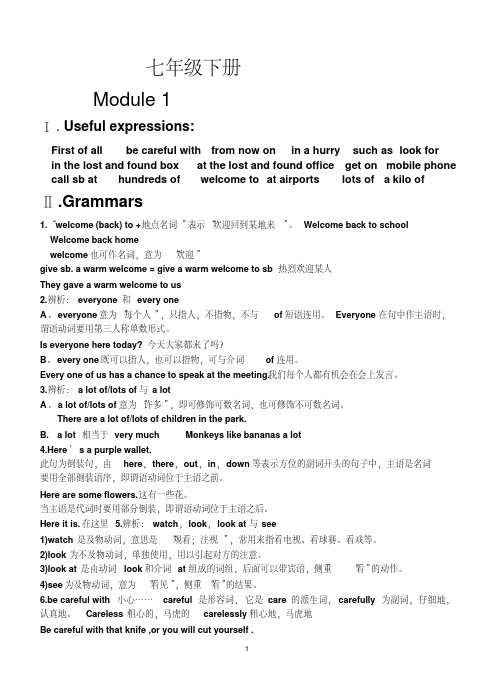
七年级下册Module 1Ⅰ.Useful expressions:First of all be careful with from now on in a hurry such as look forin the lost and found box at the lost and found office get on mobile phone call sb at hundreds of welcome to at airports lots of a kilo ofⅡ.Grammars1.“ welcome (back) to +地点名词”表示“欢迎回到某地来”。
Welcome back to schoolWelcome back homewelcome也可作名词,意为“欢迎”give sb. a warm welcome = give a warm welcome to sb 热烈欢迎某人They gave a warm welcome to us2.辨析:everyone 和every oneA、everyone意为“每个人”,只指人,不指物,不与of短语连用。
Everyone在句中作主语时,谓语动词要用第三人称单数形式。
Is everyone here today? 今天大家都来了吗?B、every one既可以指人,也可以指物,可与介词of连用。
Every one of us has a chance to speak at the meeting.我们每个人都有机会在会上发言。
3.辨析:a lot of/lots of与a lotA、a lot of/lots of意为“许多”,即可修饰可数名词,也可修饰不可数名词。
There are a lot of/lots of children in the park.B. a lot 相当于very much Monkeys like bananas a lot4.Here’s a purple wallet.此句为倒装句,由here,there,out,in,down等表示方位的副词开头的句子中,主语是名词要用全部倒装语序,即谓语动词位于主语之前。
七年级下册第三单元笔记外研版

七年级下册第三单元笔记第一节动词的一般现在时1. 动词的一般现在时表示习惯性、经常性或普遍性的动作或状态。
例如:I go to school every day.2. 动词的一般现在时的构成:主语 + 动词原形(第三人称单数要加-s)。
例如:She plays basketball every Sunday.3. 动词的一般现在时的否定形式:主语 + do/does + not + 动词原形。
例如:I do not like to eat broccoli.4. 动词的一般现在时的一般疑问句形式:Do/Does + 主语 + 动词原形?例如:Do you play the piano?第二节形容词的比较级和最高级1. 形容词的比较级用于对两者或两组事物进行比较。
其构成是在形容词后面加上-er,或在形容词前加上more。
例如:This book is more interesting than that one.2. 形容词的最高级用于对三者或三者以上的事物进行比较。
其构成是在形容词前面加上the most,或在形容词后面加上-est。
例如:She is the most beautiful girl in our class.3. 形容词比较级和最高级的不规则变化。
例如:good-better-the best.4. 表示不相等的比较级和最高级。
例如:Tom is taller than Jack. Lily is the youngest in her family.第三节可数名词和不可数名词1. 可数名词是指可以单独计算单位的名词,可以加上a/an或者具体的数字。
例如:a book, two apples.2. 不可数名词是指不能单独计算单位的名词,不能加上a/an,并且不能用具体的数字来表示。
例如:milk, water.3. 可数名词和不可数名词的用法。
例如:I have some books. I drink some milk every morning.4. 可数名词和不可数名词的量的表示。
外研社七年级下册m3 课堂笔记

课堂笔记:外研社七年级下册M3一、词汇1.1 常用词汇1.1.1 tell (v.) 告诉1.1.2 invent (v.) 发明1.1.3 truth (n.) 真相1.1.4 lie (n.) 谎言1.1.5 habit (n.) 习惯1.2 生词学习方法1.2.1 重复记忆法:反复念诵新词,加强记忆。
1.2.2 联想法:将生词和相关的图像、情景通联在一起,更容易记忆。
二、语法2.1 一般现在时2.1.1 句型:主语 + 动词原形2.1.2 用法:表示习惯、常态或客观事实2.1.3 例句:He tells stories.(他讲故事。
)2.2 现在进行时2.2.1 句型:主语 + be 动词 + 现在分词2.2.2 用法:表示现在正在进行的动作2.2.3 例句:He is telling a story.(他正在讲故事。
)三、阅读理解3.1 排除干扰项3.1.1 通过逐个排除错误选项,找到正确答案。
3.1.2 注意细节,不要被干扰项所迷惑。
3.2 理解文章主题3.2.1 通过文章的标题、开头和结尾等部分,把握文章主题。
3.2.2 掌握文章中心思想,有助于整体理解文章内容。
四、写作4.1 书写规范4.1.1 书写工整,字迹清晰,避免涂改。
4.1.2 注意标点符号的使用,保持段落清晰。
4.2 写作技巧4.2.1 多练习书面表达,提高写作能力。
4.2.2 注意文章结构,包括开头、中间内容和结尾。
五、口语5.1 口语练习5.1.1 与同伴进行英语对话练习,加强口语表达能力。
5.1.2 多与老师交流,积极参与课堂互动。
5.2 语音语调5.2.1 注意英语发音,练习正确的语音语调。
5.2.2 多听英语音频,模仿标准发音。
结语本节课主要学习了常用词汇、一般现在时和现在进行时的用法,以及阅读理解、写作和口语练习的方法。
通过课堂笔记的整理和总结,希望能够加深对课程内容的理解,提高英语学习效果。
参考文献:外研社七年级下册英语教材。
最新外研版七年级英语下册知识点整理
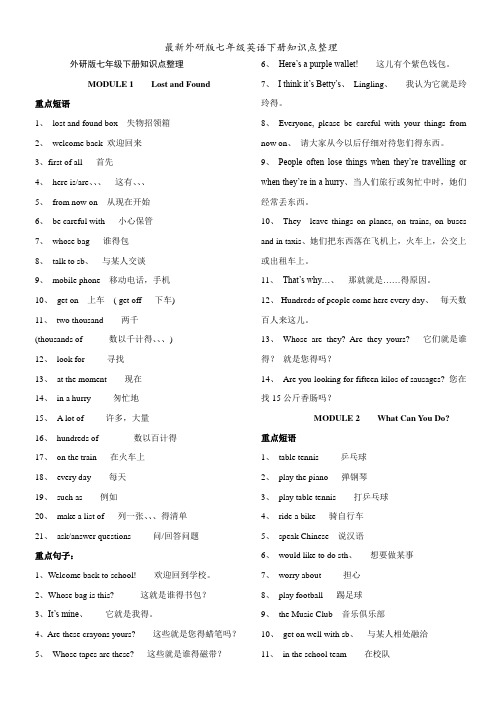
外研版七年级下册知识点整理MODULE 1 Lost and Found重点短语1、lost and found box 失物招领箱2、welcome back 欢迎回来3、first of all 首先4、here is/are、、、这有、、、5、from now on 从现在开始6、be careful with 小心保管7、whose bag 谁得包8、talk to sb、与某人交谈9、mobile phone 移动电话,手机10、get on 上车( get off 下车)11、two thousand 两千(thousands of 数以千计得、、、)12、look for 寻找13、at the moment 现在14、in a hurry 匆忙地15、A lot of 许多,大量16、hundreds of 数以百计得17、on the train 在火车上18、every day 每天19、such as 例如20、make a list of 列一张、、、得清单21、ask/answer questions 问/回答问题重点句子:1、Welcome back to school! 欢迎回到学校。
2、Whose bag is this? 这就是谁得书包?3、It’s mine、它就是我得。
4、Are these crayons yours? 这些就是您得蜡笔吗?5、Whose tapes are these? 这些就是谁得磁带?6、Here’s a purple wallet! 这儿有个紫色钱包。
7、I think it’s Betty’s、Lingling、我认为它就是玲玲得。
8、Everyone, please be careful with your things from now on、请大家从今以后仔细对待您们得东西。
9、People often lose things when they’re travelling or when they’re in a hurry、当人们旅行或匆忙中时,她们经常丢东西。
七年级下册英语外研版第八模块笔记
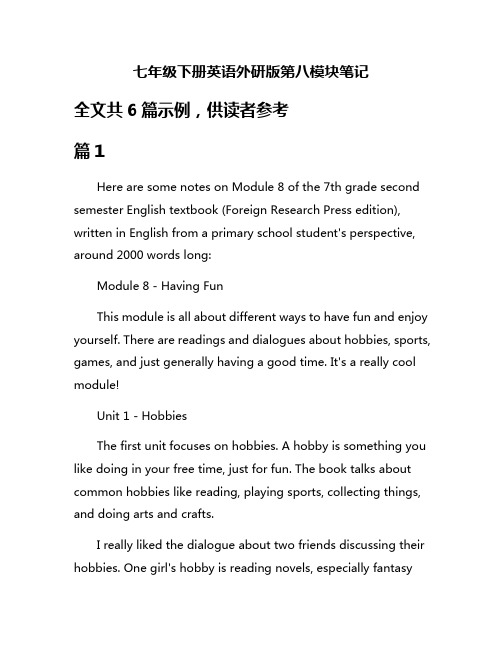
七年级下册英语外研版第八模块笔记全文共6篇示例,供读者参考篇1Here are some notes on Module 8 of the 7th grade second semester English textbook (Foreign Research Press edition), written in English from a primary school student's perspective, around 2000 words long:Module 8 - Having FunThis module is all about different ways to have fun and enjoy yourself. There are readings and dialogues about hobbies, sports, games, and just generally having a good time. It's a really cool module!Unit 1 - HobbiesThe first unit focuses on hobbies. A hobby is something you like doing in your free time, just for fun. The book talks about common hobbies like reading, playing sports, collecting things, and doing arts and crafts.I really liked the dialogue about two friends discussing their hobbies. One girl's hobby is reading novels, especially fantasystories. She gets so into the books that it's like she's living in another world! Her friend's hobby is doing craftwork like making jewelry and pottery. She finds it relaxing and satisfying to create things with her hands.There was also a cool article profiling different kids and their unique hobbies. One boy is really into remote control cars and planes. Another girl has been playing chess since she was 5 years old. A hobby can be anything you're passionate about!The grammar focus was on using the present continuous tense to talk about hobbies you're currently doing or interested in. Like "I'm reading an awesome book series right now" or "He's collecting stamps from all over the world."Unit 2 - SportsThe second unit is dedicated to sports, which are basically athletic hobbies that involve exercise and competition. All the readings were about kids doing different sports.My favorite was the one about a boy who plays cricket. Cricket is a really popular sport in some countries, kind of like baseball. He talked about how he practices batting and bowling for hours to improve his skills. It takes a lot of hard work and persistence!Another reading highlighted a girl who does gymnastics. She described the different gymnastic events like the uneven bars, balance beam, and floor exercise. It sounds really tough but also thrilling to do flips and twists in the air!The grammar point for this unit was using the present perfect tense to talk about experiences you've had. Like "I've played soccer since I was 6" or "She's never tried rock climbing before."I quite enjoy playing sports myself, especially basketball and swimming. They're such a blast and great exercise too!Unit 3 - GamesThis unit was focused on games of all kinds - video games, board games, puzzles, you name it. Games are just purely for fun and entertainment.There was a funny dialogue of two friends arguing about which video game console is better. One was teamXbox and the other was teamPlayStation. That's a big debate among gamers!My personal favorite was the reading about chess boxing. Can you believe that's actually a sport/game?! Competitors alternate between playing chess and boxing rounds. You literallyhave to be a genius and an athlete at the same time. It's completely bonkers but kind of brilliant.We learned how to use modals like "can, could, may, might" to make polite requests related to games. Like "Could you pass me the dice, please?" or "May I go first this time?"I'm a big fan of puzzle games myself, especially Rubik's Cubes. Someday I'll try and solve one of those crazy 9x9 cubes!Unit 4 - Fun ActivitiesThe final unit was all about miscellaneous fun activities beyond just hobbies, sports, and games. Things you do for pure entertainment and enjoyment.One reading described this new amusement park that opened up with amazing high-tech rides and attractions. Things like virtual reality rollercoasters and interactive 3D funhouses. It sounds so futuristic and exciting! I'd love to visit.Another article highlighted these two young YouTubers who started posting silly comedic videos from their basement. Their channel somehow went viral with millions of fans! It just goes to show how fun can come from the most unexpected places.For grammar, we practiced using gerunds (the -ing form of verbs used as nouns). Like "I love reading" or "skateboarding is his favorite activity."Overall, this was a super engaging module! It really opened my eyes to all the amazing ways kids can have fun and pursue their interests nowadays. The activities seem unlimited. I'm definitely feeling inspired to take up some new hobbies and games over summer break. Bring on the fun!篇2Here are some notes on Module 8 of the 7th grade English textbook (Xue Ren Ed.) in about 2000 words, written from a student's perspective:Module 8 - Love Nature, Love LifeThis module is all about nature and the environment. It has some really interesting readings and fun activities to help us appreciate the world around us. I'll share the key points I've learned.Unit 1: A Green FutureThe first unit talks about environmental protection and sustainable development. The text A Green Future discusses howwe need to take better care of the planet through things like recycling, saving energy and water, and reducing pollution. Some key vocabulary I learned:• Renewable energy sources like solar and win d power• Carbon footprint - the greenhouse gas emissions caused by our activities• Biodegradable products that can decompose naturallyThe reading says if we don't act now, climate change could make the Earth unlivable in the future! That's really scary. We all need to do our part, even as kids. The tips in the reading like turning off lights, taking shorter showers, and bringing reusable bags for shopping are easy things we can start doing.Unit 2: Protecting HabitatsThis unit is focused on protecting natural habitats and endangered species. The main text Trouble in Paradise talks about threats to coral reefs from pollution, overfishing, and climate change. Did you know over half of coral reefs may disappear in 30 years if we don't protect them?I found the vocabulary section on habitats super interesting:• The diverse ecosystem of a rainforest• Migratory birds that fly long distances• Deforestation from cutting down too many treesThe activities had us research an endangered animal and create a poster about its threatened habitat. I did mine on giant pandas - they're so cute! Learning about how pollution and development destroys animal homes made me really sad. We have to take care of the places they live.Unit 3: Nature AwarenessThis unit is my favorite because it celebrates the amazing nature all around us! The main text My Green Companion is about a girl's special friendship with a tree over the years. Her descriptions of the tree's beauty in different seasons were just lovely.I highlighted vocabulary words that describe nature's vibrant details:• Lush green leaves swaying in the breeze• A kaleidoscope of flowers blossoming• The earthy, musty scent after rainFor the unit task, we had to write a nature journal describing an outdoor place we visited, using descriptive language. I wroteabout the little creek behind my house and all the life I spotted there - bugs, fish, birds, plant life. It made me appreciate the natural wonders so close by.Finishing UpThroughout this module, the consistent message is how important it is to respect and care for the environment. The readings opened my eyes to threats like pollution, habitat loss, and resource depletion that are damaging ecosystems. But they also inspired me with solutions like renewable energy, conservation efforts, and making sustainable choices in daily life.My biggest takeaway is that we're all caretakers of this planet, no matter how young or old. If we develop good "green" habits now, we can help ensure a healthy world for generations to come. I feel motivated to do my part - who's with me?篇3Module 8: My HobbiesHi everyone! Today, I want to share with you all about my favorite module in our English textbook - Module 8: My Hobbies. It's super fun and interesting, and I can't wait to tell you all about it!In this module, we learned so much about different hobbies and activities. We started by learning how to talk about our own hobbies. I love playing soccer, so I was really excited to tell my classmates all about it. We even got to practice speaking in English by asking each other questions like "What's your favorite hobby?" and "How often do you do it?"One of the things I enjoyed the most in this module was learning new vocabulary words related to hobbies. We learned words like "painting," "dancing," "singing," and many more. We also learned how to use these words in sentences. For example, I can now say, "I enjoy painting beautiful pictures" or "She loves dancing to her favorite songs."Another fun activity we did was creating a poster about our hobbies. We got to draw pictures and write sentences about what we like to do in our free time. It was a great way to practice our writing skills and be creative at the same time. I made a colorful poster showing me playing soccer with my friends. I wrote, "I love playing soccer because it makes me feel happy and healthy!"In Module 8, we also learned about different famous people and their hobbies. We read about famous athletes, musicians, and artists. It was inspiring to learn how their hobbies havehelped them become successful in their careers. I was amazed to learn that some famous painters started as hobbyists, just like me!The module also included some interesting listening activities. We listened to conversations about different hobbies and had to answer questions based on what we heard. It was a bit challenging at first, but with practice, it became easier. I found it really helpful in improving my listening skills.To make learning even more fun, our teacher organized a hobby fair where we could showcase our hobbies to the whole school. We prepared presentations, performed dances, and even had a mini soccer match. It was a fantastic opportunity to share our passions with others and learn about their hobbies too.Overall, Module 8 was an exciting and enjoyable part of our English curriculum. I learned so much about different hobbies, improved my speaking and writing skills, and had a lot of fun along the way. I can't wait to continue exploring new modules and learning more amazing things in English class!That's all for my module 8 notes. I hope you enjoyed hearing about it as much as I enjoyed learning it. See you next time!Word count: 397 words篇4Here are some notes on Module 8 of the 7th grade English textbook (New Standard English, published by Foreign Language Teaching and Research Press), written in English from the perspective of a primary school student, around 2000 words long:Module 8 - Having FunThis module was all about different ways to have fun and enjoy yourself. There were readings and activities about hobbies, sports, games, and just being silly sometimes!The first unit was called "What a Collection!" It was about people's hobbies of collecting things. I learned that lots of people love collecting stamps, coins, rocks, and all sorts of other little objects. Some people even collect bizarre things like banana labels or burned-out lightbulbs! I think stamp collecting seems kind of boring to me, but maybe I'll start a cool collection someday.There was a really funny dialogue in this unit about two kids arguing over a stamp collection one of them spilled all over the floor. They were shouting at each other and calling each othernames. I laughed out loud at that part! Hopefully my friends and I don't end up fighting like that if we collect stuff together.The second unit was called "It's Game Time!" This was all about games, sports, and indoor/outdoor activities. My favorite was the reading about funny gameshow ideas that kids made up. One idea was a gameshow where you compete to put on clothes backwards and score points based on how fast you do it. Another was where contestants have to keep dipping their hands in cold water and whoever keeps them in the longest wins a prize. Those ideas are so silly but I would totally watch shows like that!We also learned about tongue twisters in this unit. Trying to say those was really hard and made my tongue feel all twisted up.I liked the one that goes "She sells sea-shells by the sea-shore" - that one's a classic! The textbook had illustrations that went along with each tongue twister to make them even funnier.In the third unit called "Go and Play!", we focused a lot on outdoor sports and activities. There were readings about things like skateboarding, hiking, biking, and camping. I'm not a huge fan of most sports, but reading about skateboarding tricks made me want to try that someday. It seems like it would be fun and a little dangerous which makes it exciting!This unit also had a funny story about two friends who went camping and everything that could go wrong did go wrong. Their tent blew away, they got rained on, a raccoon stole their food, and more. Even though their trip was a mess, the story shows they still had fun because they were laughing about all the mishaps together. True friends can make anything an adventure!The last unit was my favorite - "Ha Ha Ha". It was all about jokes, riddles, puns, and other ways to be silly and laugh. One of the texts was a list of "laughable labels" which were product names that sound really funny when you think about what they literally mean. For example, there was one brand of chips called "Hulk Crunchers" - can you imagine the Hulk just munching away loudly?We also read some classic jokes that made me crack up, like:"What do you call a boomerang that doesn't come back? A stick!""Why can't a bicycle stand up by itself? Because it'stwo-tired!"Definitely going to use those to try and make my friends and family laugh from now on.There were so many fun, engaging activities and readings throughout this whole module. Reading jokes and stories, thinking of creative collections, trying crazy new sports...it really reminded me how important it is to take breaks fromwork/school and just have a good laugh sometimes. I'm going to make an effort to keep having fun and being silly, even as I get older. This module taught me that humour and hobbies are good for the soul! I give it two thumbs up.篇5Here are some notes on Module 8 of the 7th Grade English textbook (New Edition) in English, written from the perspective of a primary school student. The length is around 2000 words.Module 8 NotesHi there! It's me again, writing down my thoughts on Module 8 of our English textbook. This module was all about "Caring for the Earth" and it really got me thinking about how important it is to take care of our planet.The first unit was called "The Environment" and it taught us a lot of new vocabulary words related to nature and the environment. Words like "pollution", "deforestation", "endangered species", and "global warming". I rememberlearning about all the different types of pollution – air pollution, water pollution, and even noise pollution! It was reallyeye-opening to see how our actions as humans can have such a big impact on the world around us.One of the reading passages was about a girl named Lucy who was really passionate about protecting the environment. She started an eco-club at her school and they did all sorts of cool things like recycling, planting trees, and even organizing a beach clean-up day. It inspired me to think about what I could do to help too.In the next unit, we learned about "Saving Energy". This was super interesting because we talked about renewable energy sources like solar power, wind power, and hydroelectric power. Did you know that the sun provides enough energy in just one hour to supply the world's energy needs for an entire year? That's crazy! We also learned about simple things we can do to save energy at home, like turning off lights when we leave a room and unplugging electronics when we're not using them.The reading passage in this unit was about a family who decided to make their home more energy-efficient. They installed solar panels, switched to energy-saving light bulbs, and even bought a hybrid car. By making these changes, they wereable to save a lot of money on their energy bills and reduce their carbon footprint at the same time. It just goes to show that small changes can really add up!The last unit was called "Protecting Wildlife" and it focused on the importance of preserving habitats and protecting endangered species. We learned about some of the threats that animals face, like habitat loss, poaching, and pollution. It was really sad to read about how many species are at risk of going extinct, but it also motivated me to want to do something to help.One of the reading passages was about a group of students who started a campaign to raise awareness about the plight of sea turtles. They made posters, gave presentations, and even organized a beach clean-up day to remove debris that could harm the turtles. It was really inspiring to see how passionate they were about protecting these amazing creatures.Throughout this module, we also did a lot of fun activities and projects. We made posters to raise awareness about environmental issues, did a class recycling drive, and even had a "green day" where we tried to minimize our energy use and waste as much as possible. It was a great way to put what we were learning into practice.Overall, I really enjoyed this module and I learned so much about the importance of caring for our planet. It's made me want to be more mindful of my own actions and how they impact the environment. I'm going to try to reduce, reuse, and recycle as much as I can, and I'm even thinking about starting an eco-club at my school like Lucy did.The Earth is our home, and it's up to all of us to take care of it. I'm glad our English textbook taught us about these important issues in a way that was easy to understand and engaging. I'm feeling inspired to be a better steward of the environment and to do my part to protect our beautiful planet.篇6Module 8 - Our NeighborsThis module was all about different countries and cultures around the world. It had some really cool readings and activities that taught me a lot!The first unit was called "Our Asian Neighbors." We learned about countries like Japan, South Korea, and India. The reading about Japan was super interesting. It talked about some of the unique traditions they have like putting on slippers when going inside, bowing to greet people, and eating with chopsticks. Ididn't know that sumo wrestling and martial arts also originated in Japan. The Korean reading focused on things like K-pop music, Korean dramas, and yummy foods like kimchi. I want to visit Seoul one day!For India, we read about colorful festivals like Holi and Diwali.I loved looking at the vibrant pictures of people celebrating by throwing colored powder and lighting lamps. Indian culture seems so diverse with different religions, languages, and foods across the regions. I definitely want to try more Indian dishes beyond just curry and naan bread. The activities had us researching Asian countries and presenting what we learned to the class which was fun.The next unit was "Our European Neighbors." We focused on places like the UK, France, Germany, and Italy. For the UK, I found out that English actually originated there and spread to places like the US because of British colonization in the past. I thought it was neat learning about iconic British things like double-decker buses, red phone booths, Buckingham Palace, and the guards with the tall furry hats. We also read about England, Scotland, Wales, and Northern Ireland making up the UK.The reading on France taught me that French people tend to be very fashionable and put a lot of emphasis on looking good.Of course, we learned about the Eiffel Tower, the Louvre museum, and French foods like crepes, croissants, and cheese. For Germany, I was surprised to learn that Berlin used to be divided into East and West by a huge wall until 1989! We read about Oktoberfest, German cars like BMWs and Mercedez, and the legend of the Brothers Grimm fairytales originating there.The last European country was Italy - famous for pizza, pasta, the Roman Colosseum, the Leaning Tower of Pisa, and trendy fashion capitals like Milan. After reading about European nations, we did a fun project comparing and contrasting different cultures. My group focused on architecture and public spaces across various European cities.The third unit was called "Our North American Neighbors" which included the United States, Canada, and Mexico. For the US, I already knew a lot since that's where I live! But I still learned new things like the difference between states and territories, the levels of government, immigration and the idea of the US as a "melting pot" or "salad bowl" of cultures.The reading on Canada highlighted its massive size, natural landscapes, winter sports, French/English bilingualism, and Indigenous cultures. I didn't realize how much wilderness and open space there is up north! For Mexico, we focused on aspectslike Spanish being the main language, ancient civilizations like the Mayans and Aztecs, Cinco de Mayo celebrations, Mexican art/music, and mouth-watering cuisines. We watched cool videos showcasing colorful Mexican folk dances in traditional dresses.The final unit covered "Our Other World Neighbors" looking at countries in South America, Africa, and the Caribbean/Pacific islands. The first reading introduced me to Brazil - the largest nation in South America. I learned that Portuguese is the official language there, along with facts about the Amazon rainforest, Rio de Janeiro's big carnival festival, Brazilian soccer stars, and unique animals like toucans. I thought the facts about Ecuador and the Galapagos Islands were fascinating too with the unique wildlife there.For Africa, we focused mainly on the countries of Egypt, South Africa, Nigeria, and Kenya. The Egyptian section went into depth about ancient pharaohs, hieroglyphics, mummies, and impressive structures like the Pyramids of Giza and Sphinx. South Africa is known for its diverse ethnic groups, wildlife safaris, Nelson Mandela's leadership, and the globaltravel hub of Cape Town. Nigeria and Kenya readings highlighted the vibrantcultures, music, clothing, and foods across various ethnic groups in those nations.The last few lessons gave an overview of island countries and territories across the Caribbean and the Pacific. I learned about places like Cuba, Jamaica, Hawaii, and Fiji. We read about aspects like reggae music, steel drum bands,luaus, hula dancing, beautiful beaches, snorkeling/diving spots, and mouth-watering tropical fruits. There was even a fun lesson teaching us some simple phrases in Hawaiian!Overall, Module 8 really opened my eyes to the diversity of cultures, traditions, foods, and lifestyles across the globe. While countries have their own unique qualities, the readings showed how we are all interconnected as the "human family." I feel like I have a much broader perspective and appreciation for other societies after studying this module. Now I really want to travel the world someday!。
外研版初一下M1-M6课堂笔记
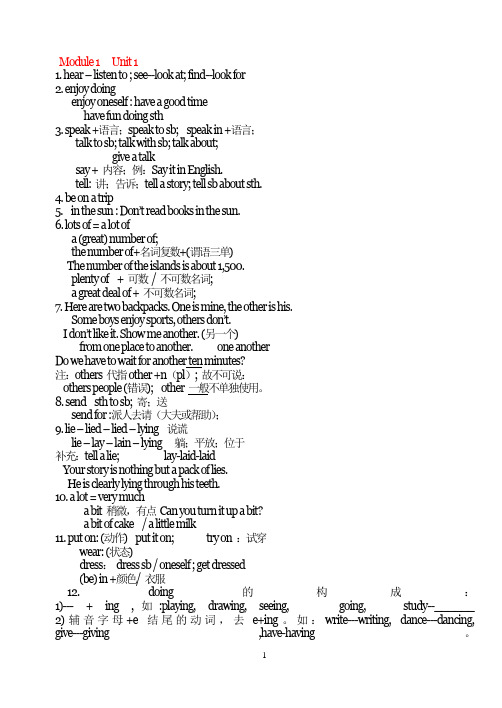
Module 1 Unit 11. hea r – listen to ; see--look at; find--look for2. enjoy doingenjoy oneself : ha ve a good timeha ve fun doing sth3. speak +语言;speak to s b; speak in +语言;talk to sb; talk with sb; talk about;give a tal ksa y + 内容;例:Sa y i t in English.tell: 讲;告诉;tell a s tory; tell sb about s th.4. be on a trip5. in the sun : D on’t read books in the sun.6. lots of = a lot ofa (g reat) number of;th e number of+名词复数+(谓语三单)Th e numb er of th e islands is abou t 1,500.plenty of + 可数/ 不可数名词;a g rea t d eal of + 不可数名词;7. H ere are two bac kpac ks. On e is mine, the other is his.Some boys enjo y spo rts, others don’t.I don’t like it. Show m e anoth er. (另一个)f rom one place to anoth er.one anotherD o we ha ve to wait for another ten minutes?注:others 代指oth er +n(pl); 故不可说:others people (错误); o ther 一般不单独使用。
外研版七年级下册.笔记知识点汇总

七年级下册Module 1Ⅰ.Useful expressions:First of all be careful with from now on in a hurry such as look forin the lost and found box at the lost and found office get on mobile phone call sb at hundreds of welcome to at airports lots of a kilo ofⅡ.Grammars1.“ welcome (back) to +地点名词”表示“欢迎回到某地来”。
Welcome back to schoolWelcome back homewelcome也可作名词,意为“欢迎”give sb. a warm welcome = give a warm welcome to sb 热烈欢迎某人They gave a warm welcome to us2.辨析:everyone 和every oneA、everyone意为“每个人”,只指人,不指物,不与of短语连用。
Everyone在句中作主语时,谓语动词要用第三人称单数形式。
Is everyone here today? 今天大家都来了吗?B、every one既可以指人,也可以指物,可与介词of连用。
Every one of us has a chance to speak at the meeting.我们每个人都有机会在会上发言。
3.辨析:a lot of/lots of与a lotA、a lot of/lots of意为“许多”,即可修饰可数名词,也可修饰不可数名词。
There are a lot of/lots of children in the park.B. a lot 相当于very much Monkeys like bananas a lot4.Here’s a purple wallet.此句为倒装句,由here,there,out,in,down等表示方位的副词开头的句子中,主语是名词要用全部倒装语序,即谓语动词位于主语之前。
最新外研版七年级英语下册知识点总结
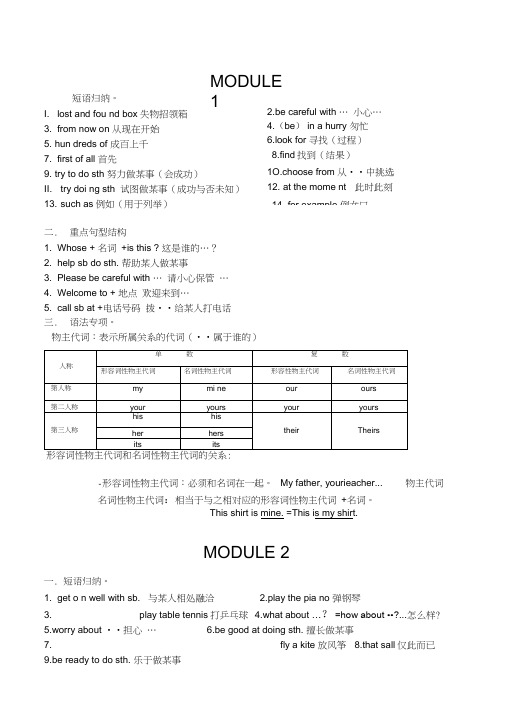
短语归纳。
I. lost and fou nd box 失物招领箱 3. from now on 从现在开始 5. hun dreds of 成百上千 7. first of all 首先9. try to do sth 努力做某事(会成功)II. try doi ng sth 试图做某事(成功与否未知) 13. such as 例如(用于列举) 二. 重点句型结构1. Whose + 名词 +is this ? 这是谁的…?2. help sb do sth. 帮助某人做某事3. Please be careful with … 请小心保管 …4. Welcome to + 地点 欢迎来到…5. call sb at +电话号码 拨••给某人打电话 三. 语法专项。
物主代词:表示所属关系的代词(••属于谁的)形容词性物主代词和名词性物主代词的关系:-形容词性物主代词:必须和名词在一起。
My father, yourieacher... 物主代词名词性物主代词:相当于与之相对应的形容词性物主代词 +名词。
This shirt is mine. =This is my shirt.MODULE 2一. 短语归纳。
1. get o n well with sb. 与某人相处融洽2.play the pia no 弹钢琴3. play table tennis 打乒乓球4.what about …? =how about ••?...怎么样?5.worry about ••担心 …6.be good at doing sth. 擅长做某事7.fly a kite 放风筝 8.that sall 仅此而已9.be ready to do sth. 乐于做某事 MODULE12.be careful with … 小心… 4.(be ) in a hurry 匆忙 6.look for 寻找(过程) 8.find 找到(结果)1O.choose from 从••中挑选 12. at the mome nt 此时此刻 14. for example 例女口二.重点句型结构。
- 1、下载文档前请自行甄别文档内容的完整性,平台不提供额外的编辑、内容补充、找答案等附加服务。
- 2、"仅部分预览"的文档,不可在线预览部分如存在完整性等问题,可反馈申请退款(可完整预览的文档不适用该条件!)。
- 3、如文档侵犯您的权益,请联系客服反馈,我们会尽快为您处理(人工客服工作时间:9:00-18:30)。
二册笔记M1,U1语法:代词的用法及种类:M1U11.Welcome back to school. 欢迎回到学校2.first of all 首先3.the lost and found box 失物招领箱4. a lot of=lots of =many+much5. mine=my + n , yours=your+n , hers=her +n6.Thank you. You’re welcome! 谢谢你。
不客气。
7.Look at sth.看某物8.Betty’s(名词所有格)= 名物 = 形物9.be careful with your things小心你的东西10.from now on从现在起11. Let me see.让我想想,让我看看M1U21.talk to\ with sb 和某人谈话2.get on the bus 上公交车3.Welcome to... 欢迎到...4. lost and found office 失物招领处5. lose things 丢东西6. in a hurry 匆匆忙忙7. leave things some place 把某物落在某地8.That`s why ...那就是为什么...的原因9. at airports and stations.在机场和车站10.hundreds of 成百上千的11.every day 每天 everyday 每天的12. look for 寻找, find 找到13.at the moment 现在,此刻14.fifteen kilos of...十五公斤的... 15.call sb at +号码拨打...找某人M2语法:1.can的用法:情态动词can的用法:情态动词是辅助动词帮助说明能力、意愿等的词,它没有人称和数的变化, 后边直接加动词原形。
肯定句:主语+can + 动词原形否定句:直接在can后加“not”.He can’t (cannot) swim.一般疑问句直接把can提前Can you dance ?特殊疑问句:特殊疑问词+ 一般疑问句?What can you do ?2.Would you like sth?Yes, please. No, thanks.Would you like to do sth?Yes, I`d like to . Sorry,+理由。
M2,U11 .on the board 在布告板上2.would like sth =want sth 想要某物would like to do sth = want to do sth ?想要做某事3.join the Music\dance\Chinese club加入俱乐部4.play the piano 弹钢琴5.What about (doing) sth?=How about (doing) sth ?6.join the food and drink club加入饮食俱乐部7.That`s all. 就这些\仅此而已。
8.dance really well \ speak Chinese very well9.Don`t worry about sb\ sth. 不要担心某人\某物10.teach sb sth 教给某人某事 (teach+双宾语)11.choose your favourite club选择你最喜爱的俱乐部12.play table tennis打乒乓球13.ride a bike骑自行车M2U21.would like to do ...=want to do...想要/愿意做某事2.the class monitor 班长3.get on well with everyone和每个人相处得好4.work hard学习刻苦,努力学习5.do well in sth=be good at sth擅长/在某方面做得好6.at school在学校, at home 在家7.be always ready to help others总是乐于助人8.choose sb as\for...选某人做...9.promise to do sth 保证、许诺做某事10.the PE monitor体委11.run really fast 跑的真快12.fit and healthy 身强体健13.in the playground在操场上14.between lessons在两节课之间15.play most ball games well 多数球类运动打得好16.play basketball 打篮球17in the school team 在校队里18.get the best score in every match在每场比赛中得最高分19.the cleaning monitor 卫生委员20.help 的三句型:help sb do \to do \with sth21.do cleaning 打扫卫生22.clean and tidy 干净又整洁23.I`m sure ...我肯定、保证...24.just like 正如,正像25.make our classroom beautiful 使我们的教室美丽make 的用法: make sb +do sth make sb +形M3U1语法:be going to 结构:1. 定义: 表达自己打算做某事、计划做某事或者有意做某事。
2. 结构: be going to do sth3. 时间短语:this afternoon / evening, tonighttomorrow ,next , in +一段时间等1.go over lessons 复习功课2.be going to do sth 计划、打算做某事3.at the weekend在周末4.on Saturday morning在星期六上午5.check my email查收我的电子邮件6.do my homework做作业7.help with the housework帮忙做家务help三句型:help sb do/ to do/ with sth8.see/ go to a movie 看电影9.in the afternoon在下午10.Sure = Of course 当然11.who else 别的还有谁else的用法:放在不定代词和疑问词的后面。
12.have a piano lesson上钢琴课13.have a picnic吃野餐14.would you like to join us?-Yes, I`d love to.15.meet in the park 在公园见面16.at one o`clock在一点17.what are your plans for...?你...的计划是什么?18.stay at home alone独自待在家19.Don`t be silly!别傻了。
20.a fantastic weekend一个极好的周末M3U21.look forward to(doing) sth期待着(做)某事2.the football match足球比赛3.make some new friends 交新朋友4.wear the team shirt穿队服5.cheer the players为选手加油\欢呼6.win the match赢了比赛(win+名次和项目)lose the match输了比赛1. enjoy myself =have fun =have a good time 玩得高兴2.during the May Day holiday在五一假期期间3.On the morning of 1st May在五月一日的早上4.get up late 起床晚5. read a book读书6.In the afternoon在下午7.go out with my family and friends和家人朋友一起出去8. take a walk in the country在乡间散步9.go swimming去游泳10.on 2nd May 在五月二日11.collect litter 收集垃圾12.in the park 在公园里13.near my friend’s house在朋友家附近14.busy but good fun 忙碌但有乐趣1.spend the summer holiday 过暑假spend time doing sth =spend time on sth花费时间做某事2.at home在家3. be different from 与...不同4.go on a summer camp 去夏令营5.stay with sb 和某人呆在一起6.speak English 说英语7.go sightseeing= do some sightseeing去观光8.have a picnic 吃野餐9.on the beach在沙滩上M4语法:一般将来时表示将来发生的动作或存在的状态助动词shall/will + 动词原形(当主语第一人称时,一般用shall,shall用于第一人称,常被will 所代替。
)肯定式: 主语+shall/will+动词原形+其他否定式: 主语+shall/will+not+动词原形+其他.疑问式: Shall/Will+主语+动词原形+其他简略回答: (肯) Yes,主语+shall/will .(否) No,主语+shall/will+not …M4U11.in the future在将来2.In twenty years’ time=in twenty years 二十年时间后3.there won’t be=there isn`t going to be将不会有4.study at home在家学习5.get information获得信息6.on the Internet在网上 by Internet通过网络7.ask questions 提问题8.I’m not sure.=I don`t know.我不知道9.good fun好有趣10.make friends交朋友11.check the students’ level 检查学生的水平12.be able to do =can do 能够做...13.not ...any more=no more 不再14.have a lot of homework to do有许多作业要做15. free time空闲时间16.That’ll be great!那将会棒极了!M4U2.What will sth be like?某物将是什么样?e true 实现,成真3.in the future 在将来,在未来4.a change of 一个...的变化5.a new kind of clothes一种新型的衣服6.no more =not ... any more 不再7.light rain 小雨8.cold wind 冷风9.in spring在春天10.all year全年,整年11.heavy rain 大雨12.The sea level 海平面13.as well也有1.not ... any more = no more不再2.2.travel by bus 乘公交车旅行3.3.be cheap to travel 旅行很便宜4. be +adj to do sth5.4.not only...but also 不但...而且(谓语就近)6.5.over land越过陆地7.6.over the sea 越过大海8.7.into space进入太空9.8.traffic jams 交通堵塞10.9.in the air 在空中11.10.do all the heavy and difficult jobs12.做所有重且难的工作13.11.do light and easy work14.做轻松容易的工作15.12.Working hours工作时间16.13.have long holidays有很长的假期M5语法:特殊疑问句:特殊疑问词+助+主谓+其他?who谁(主格)、whom谁(宾格)、whose谁的,which哪一个,when什么时候,where 提问地点“那里,why 提问原因“为什么”,What color什么颜色,What size什么尺码,What time 什么时间,what class "几班",what kind of "哪种",How old问年龄、年代,How many问可数名词数量,How much询问不可数名词的数量、物品的价格,How long/wide/ tall/high deep/far/close提问时间的长短,物体的长、宽、高、深、远、近,How soon 对“in+一段时间”提问,表示“多久之后”,How often 提问频率“多久一次”,How about用来征求对方意见,how heavy问重量...注意:1.回答特殊疑问句时,不能用yes / no,即问什么答什么。
